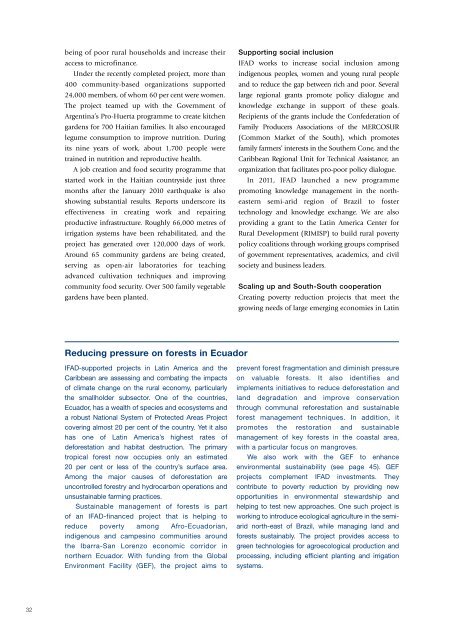ANNUAL REPORT 2011 - IFAD
ANNUAL REPORT 2011 - IFAD
ANNUAL REPORT 2011 - IFAD
Create successful ePaper yourself
Turn your PDF publications into a flip-book with our unique Google optimized e-Paper software.
32<br />
being of poor rural households and increase their<br />
access to microfinance.<br />
Under the recently completed project, more than<br />
400 community-based organizations supported<br />
24,000 members, of whom 60 per cent were women.<br />
The project teamed up with the Government of<br />
Argentina’s Pro-Huerta programme to create kitchen<br />
gardens for 700 Haitian families. It also encouraged<br />
legume consumption to improve nutrition. During<br />
its nine years of work, about 1,700 people were<br />
trained in nutrition and reproductive health.<br />
A job creation and food security programme that<br />
started work in the Haitian countryside just three<br />
months after the January 2010 earthquake is also<br />
showing substantial results. Reports underscore its<br />
effectiveness in creating work and repairing<br />
productive infrastructure. Roughly 66,000 metres of<br />
irrigation systems have been rehabilitated, and the<br />
project has generated over 120,000 days of work.<br />
Around 65 community gardens are being created,<br />
serving as open-air laboratories for teaching<br />
advanced cultivation techniques and improving<br />
community food security. Over 500 family vegetable<br />
gardens have been planted.<br />
Reducing pressure on forests in Ecuador<br />
<strong>IFAD</strong>-supported projects in Latin America and the<br />
Caribbean are assessing and combating the impacts<br />
of climate change on the rural economy, particularly<br />
the smallholder subsector. One of the countries,<br />
Ecuador, has a wealth of species and ecosystems and<br />
a robust National System of Protected Areas Project<br />
covering almost 20 per cent of the country. Yet it also<br />
has one of Latin America’s highest rates of<br />
deforestation and habitat destruction. The primary<br />
tropical forest now occupies only an estimated<br />
20 per cent or less of the country’s surface area.<br />
Among the major causes of deforestation are<br />
uncontrolled forestry and hydrocarbon operations and<br />
unsustainable farming practices.<br />
Sustainable management of forests is part<br />
of an <strong>IFAD</strong>-financed project that is helping to<br />
reduce poverty among Afro-Ecuadorian,<br />
indigenous and campesino communities around<br />
the Ibarra-San Lorenzo economic corridor in<br />
northern Ecuador. With funding from the Global<br />
Environment Facility (GEF), the project aims to<br />
Supporting social inclusion<br />
<strong>IFAD</strong> works to increase social inclusion among<br />
indigenous peoples, women and young rural people<br />
and to reduce the gap between rich and poor. Several<br />
large regional grants promote policy dialogue and<br />
knowledge exchange in support of these goals.<br />
Recipients of the grants include the Confederation of<br />
Family Producers Associations of the MERCOSUR<br />
(Common Market of the South), which promotes<br />
family farmers’ interests in the Southern Cone, and the<br />
Caribbean Regional Unit for Technical Assistance, an<br />
organization that facilitates pro-poor policy dialogue.<br />
In <strong>2011</strong>, <strong>IFAD</strong> launched a new programme<br />
promoting knowledge management in the northeastern<br />
semi-arid region of Brazil to foster<br />
technology and knowledge exchange. We are also<br />
providing a grant to the Latin America Center for<br />
Rural Development (RIMISP) to build rural poverty<br />
policy coalitions through working groups comprised<br />
of government representatives, academics, and civil<br />
society and business leaders.<br />
Scaling up and South-South cooperation<br />
Creating poverty reduction projects that meet the<br />
growing needs of large emerging economies in Latin<br />
prevent forest fragmentation and diminish pressure<br />
on valuable forests. It also identifies and<br />
implements initiatives to reduce deforestation and<br />
land degradation and improve conservation<br />
through communal reforestation and sustainable<br />
forest management techniques. In addition, it<br />
promotes the restoration and sustainable<br />
management of key forests in the coastal area,<br />
with a particular focus on mangroves.<br />
We also work with the GEF to enhance<br />
environmental sustainability (see page 45). GEF<br />
projects complement <strong>IFAD</strong> investments. They<br />
contribute to poverty reduction by providing new<br />
opportunities in environmental stewardship and<br />
helping to test new approaches. One such project is<br />
working to introduce ecological agriculture in the semiarid<br />
north-east of Brazil, while managing land and<br />
forests sustainably. The project provides access to<br />
green technologies for agroecological production and<br />
processing, including efficient planting and irrigation<br />
systems.

















